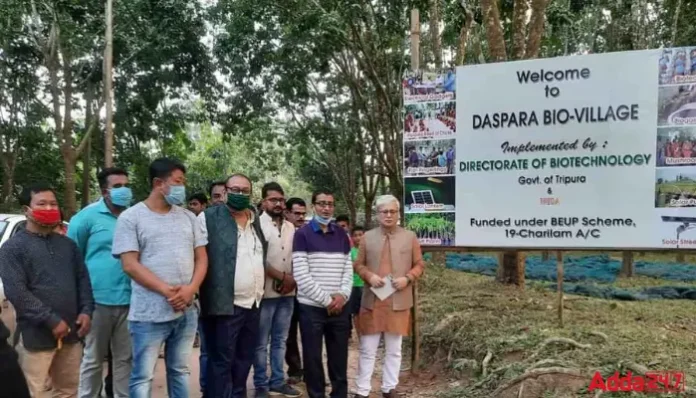The Tripura government has embarked on a mission to provide sustainable livelihood opportunities in rural areas through its ‘bio-village’ project, Deputy Chief Minister Jishnu Dev Varma said.
In the Sepahijala district, five such villages with bio-gas power plants, better cattle breeds, solar-powered agricultural equipment, and energy-efficient electrical gadgets have already been built, and five more will do so shortly, according to him.
The project resulted in a monthly increase of Rs 5,500 in household income, Dev Varma said, adding that more than 500 households benefited.
He said farmers have learned simpler methods of growing mushrooms and installing and maintaining biogas and bio-composting units.
He added that the project aims at ensuring global socioeconomic development among rural areas utilizing climate-friendly technologies.
“It has been a successful project and we will try to replicate the model in more villages as it is environment-friendly, sustainable, healthy, and beneficial for the rural people,” Debbarma told reporters.
Forty-year-old Sumita Debbarma, a resident of tribal hamlet Borkurbari in Sepahijala district, was happy as she could earn around Rs 20,000 by selling four piglets of Hampshire breed in the local market.
She also sells ducklings of the Khaki Campbell breed, earning an additional Rs 6,000 per month, through the Department of Biotechnology’s “bio-village” initiative.
Gurudas Debbarma, a septuagenarian, said he was given a solar pump for irrigation with which he grows vegetables and crops throughout the year, increasing his income.
“The idea of a bio-village promotes the use of organic farming methods in a specific area along with other environmentally beneficial agricultural elements. But the goal of our approach is to ensure socio-economic advancement in order to achieve sustainable growth. It also focuses on providing multi-entrepreneurial support to minimize the risk of failure due to natural disasters,” he said.
Anjan Sengupta, Senior Scientific Officer of the Biotechnology Directorate, said the project has been slightly modified to be implemented in the next five villages.
“The modified bio-village concept envisages wholesome participation of villages and provides autonomy to beneficiaries for planning, designing, and selecting components of their choice,” Sengupta said.
Villagers can choose from multiple eco-friendly components to get maximum return in terms of money as well as other indices such as comfort and happiness.
The project, which was initially launched as a pilot project in a village, has now been expanded to improve the economy of the village as a whole, he said.
The project offers options such as the establishment of a bio-gas unit, solar pump, street light biomass stove, biotech kits that comprise bio-fertilizer and pesticide for agriculture, and animal husbandry and pisciculture.
Beneficiaries can select between four and five components based on their potential, interest, and available resources.
“Five kilometers from Bishramganj Bazar, Borkurbari is likely the first tribal community in India to be transformed into a bio-village. The project is well-liked by the locals “said Sengupta.
According to him, the majority of recipients are women and have mastered mushroom cultivation, which has provided them with additional funding. He claimed that bio-villages such as Das Para, Kharangsingh Para, and Fatikcherra are changing people’s economic conditions for sustainable development.


